Reports
Reports
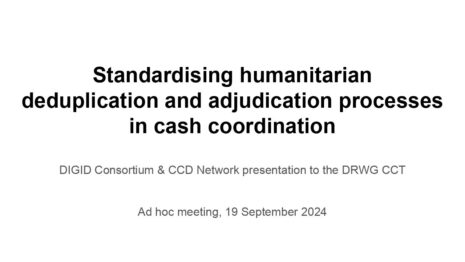
Standardizing humanitarian deduplication and adjudication processes in cash coordination
Summary:
This document summarizes a series of interviews with 4 humanitarian stakeholder groups, where interviewees were asked to share experience and document examples of commonly used data models and rules for deduplication and adjudication, with the objective to understand the need and process for agreeing on commonly used data models, incl. potential pathways for uptake.
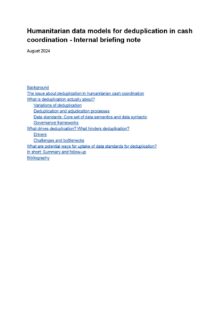
Humanitarian data models for deduplication in cash coordination – Internal briefing note
Summary:
This document summarizes a sector wide discussion facilitated by DIGID, CCD and DRWG/ CTT with key stakeholders to gather learnings about 1) commonly agreed data models for deduplication of aid recipients, cash assistance packages, referrals, and 2) commonly used business rules for deduplication and adjudication processes.
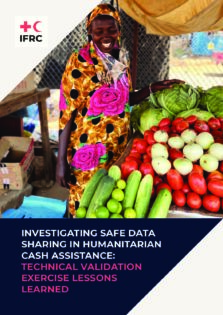
INVESTIGATING SAFE DATA SHARING IN HUMANITARIAN CASH ASSISTANCE: TECHNICAL VALIDATION EXERCISE LESSONS LEARNED
Summary:
This report highlights key lessons learned from conducting a technical validation exercise with humanitarian organizations providing cash programming in Uganda and South Sudan. Building on prior interviews and landscaping research of the processes and systems used in these countries, the technical exercise used a digital prototype, or simulated environment, to better understand potential improvements in data-sharing practices.
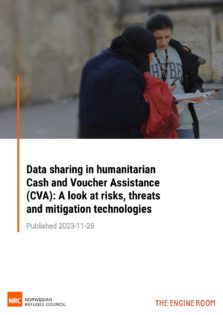
Data sharing in humanitarian Cash and Voucher Assistance (CVA): A look at risks, threats and mitigation technologies
Summary:
This report concluded a research into key risks and threats related to data sharing in CVA. It offers some key findings and observations, a mapping of the general landscape of relevant risks, and an evaluation of some of the technologies that came up in the research as potential mitigation measures.
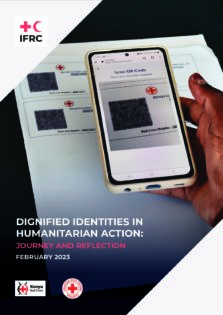
Dignified Identities in humanitarian action: Journey and reflection
Summary:
This report summarizes the journey and achievements of the Dignified Identity in Cash Assistance (DIGID) consortium to develop, test and validate the humanitarian digital identity concept it launched in 2019 in cash assistance and continuity of health care, and in migration contexts in Kenya and Uganda.
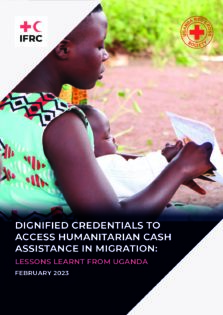
Dignified credentials to access humanitarian cash assistance in migration: lessons learnt from Uganda
Summary:
This report is part of the Dignified Identity in Cash Assistance in the context of migration, a field pilot was implemented in the Bukedea District in Uganda to explore opportunities and risks of humanitarian digital credentials for unmapped communities to access cash assistance in disaster-prone areas.
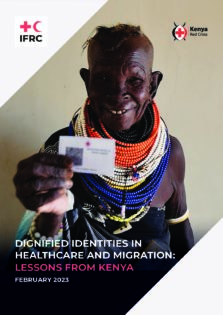
Dignified Identities in healthcare and migration: lessons from Kenya
Summary:
As part of the Dignified Identity in Cash Assistance in the context of migration, a field pilot was implemented in the Kalobeyei refugee integrated settlement in Kenya to explore opportunities and risks of humanitarian digital identity for access healthcare services in displacement settings.
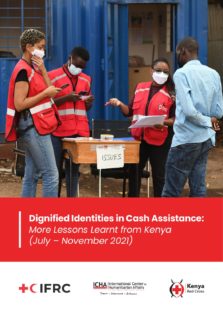
Dignified Identities in Cash Assistance: More Lessons Learnt from Kenya (July – November 2021)
Summary:
Read the lessons learned from the DIGID project extension between July and November 2021. The Dignified Identities in Cash Assistance (DIGID) project consortium aims to understand the opportunities and risks of digital identity (ID) technology in providing humanitarian cash assistance to people with no official IDs.
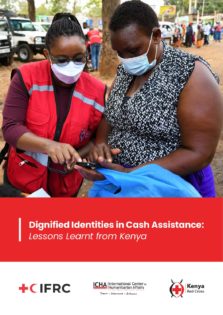
Dignified Identities in Cash Assistance: Lessons Learnt from Kenya
Summary:
As part of the Dignified Identities in Cash Assistance (DIGID) project a field pilot was conducted in May 2021 to understand the opportunities and risks of digital identity (ID) technology in providing humanitarian cash assistance to people with no official IDs. Read the lessons learned from this pilot project.
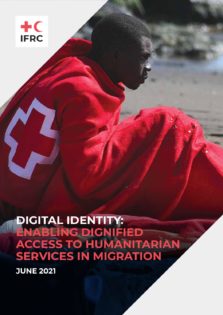
Digital identity: Enabling Dignified Access to Humanitarian Services in Migration
Summary:
This report sheds light on the needs and concerns of people on the move when it comes to identification, based on interviews with a range of migration experts and stakeholders. The report also makes specific recommendations for organisations contemplating the use of digital technology to identify the migrants they serve.

Digital Identity: An analysis for the humanitarian sector
Summary:
The ability to prove one’s identity is an increasingly important aspect of contemporary society. But identification can represent a significant challenge to people receiving humanitarian aid. Advances in technology hold much promise in the form of digital identification.
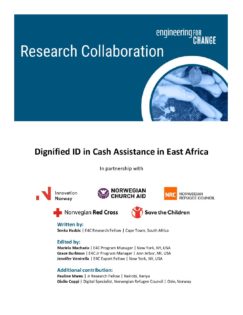
Dignified ID in Cash Assistance in East Africa
Summary:
Digital interventions must be disseminated in enabling environments that allow the services to operate efficiently and ethically. Trends that enable successful digital ID solutions include (1) trust, (2) standards and policy, and (3) ICT infrastructure; in addition to overarching global initiatives and collaborations.
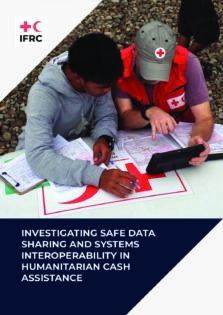
Investigating Safe Data Sharing and Systems Interoperability in Humanitarian Cash Assistance
Summary:
This report offers a technical landscaping of the current state of data sharing and interoperability in the sector and evaluates the potential of emerging technologies and operating models to address challenges in current approaches. The analysis is focused on cash programming, and specifically on two use cases: deduplication of beneficiaries, and referrals of individuals.
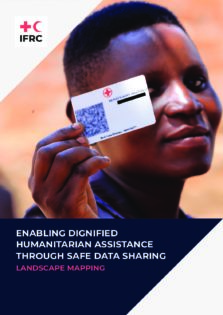
Enabling Dignified Humanitarian Assistance Through Safe Data Sharing
Summary:
The landscape mapping report is divided into five separate reports. The overview report covers high-level drivers and challenges, opportunities for improving the interoperability of systems and data sharing in the context of cash and voucher assistance (CVA). Then four separate ‘use case’ reports relate to ‘pain points’ in the overall CVA business process.
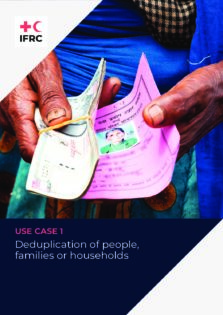
USE CASE 1 – Deduplication of people, families or households
Summary:
Deduplication of people, families or households
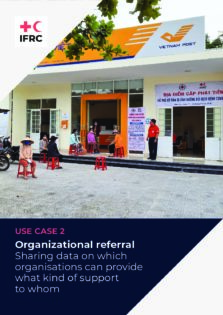
USE CASE 2 – Organizational referral
Summary:
Sharing data on which organisations can provide what kind of support to whom
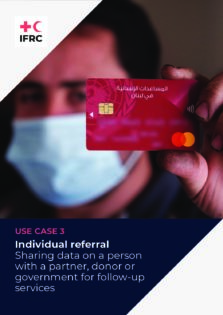
USE CASE 3 – Individual referral
Summary:
Sharing data on a person with a partner, donor or government for follow-up services
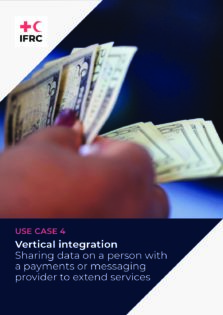
USE CASE 4 – Vertical integration
Summary:
Sharing data on a person with a payments or messaging provider to extend services